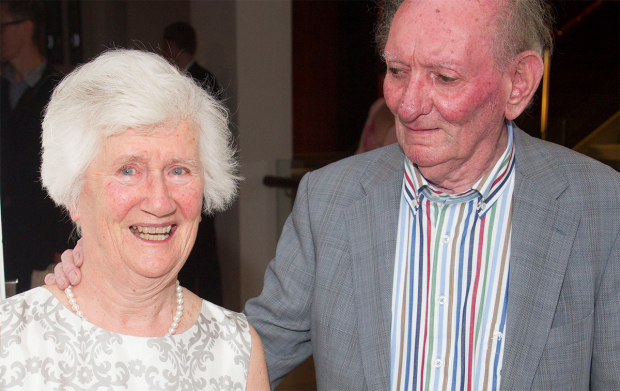Michael Coveney pays tribute to Irish dramatist Brian Friel
The playwright was a deeply private and genuinely modest man

© Dan Wooller for WhatsOnStage
Brian Friel, the great Irish dramatist, "the Irish Chekhov," died on Friday morning aged 86 and will be buried this afternoon in Glenties, County Donegal, without any undue fuss or ceremony. No memorial is planned.
Friel was a deeply private and genuinely modest man, and would have wanted it no other way; his mother was one of those "five brave Glenties women" who lit up one of his most successful plays, Dancing at Lughnasa (1990), in their famous kitchen hoe-down; Broadway fans, less familiar with lunar mythology than Friel’s native audiences, affectionately dubbed the play "Dancing at Lasagna."
Glenties, disguised as the fictional town of "Ballybeg" in almost every Friel play, was the centre of his emotional memory, though Friel’s constant theme is that memory is a source of invention and would approvingly quote Oscar Wilde saying that the malleable privilege of the artist is to "give an accurate description of what has never happened."
The ambivalence and duality in his writing allowed for the poetry of his thought in dramatising issues of national identity, political and personality division, a talent that first came gloriously into focus for me at the very first performance of Translations (with an unknown Liam Neeson in the cast) at the Guild Hall, Derry, in 1980.
The Guild Hall had been the setting for his 1973 play The Freedom of the City, a response to the disaster of Bloody Sunday in Derry, when Friel was protesting on the streets. Albert Finney directed the play at the Royal Court. But in 1980, Friel and the actor Stephen Rea formed a new cross-border company, Field Day, and launched it with Translations, a play that re-examined the naming of places, the drawing of maps and the signature of language in an old hedge school of the 1830s.
The play became an instant classic, and I returned to Derry each autumn for the new Field Day play – written by Friel, or his great friend Seamus Heaney, or Thomas Kilroy, or the poets Tom Paulin or Derek Mahon – for several years. The company was a crucible of brilliant creative and critical Irish writing, and a force for political influence and good, for a decade before it expired in acrimony and Friel gave Dancing at Lughnasa to the Abbey.
Friel was, to start with, a short story writer published in the New Yorker, and a teacher. He trained, unhappily, for the priesthood for two years before marrying his devoted wife, Anne, with whom he had five children. He said he learned about theatre from observing the great Irish director Tyrone Guthrie open a new theatre in Minnesota, realising that audiences responded to plays with stomach and heart rather than intellect. His first hit – revived in 2012 in a beautiful production by Lyndsey Turner at the Donmar Warehouse – was Philadelphia, Here I Come (1964), set on the eve of a young man’s emigration from Donegal to New York, the character split into two, public and private, a device later adopted by Trevor Griffiths and Alan Bennett.
His other great plays include perhaps his most overtly Chekhovian, Aristocrats (1979), and probably his greatest of all, Faith Healer (also 1979), in which four dissenting monologues from three speakers — a dazzling huckster (or is he a messiah?), his wife and their English manager – trace the fortunes of a touring show and their fateful homecoming; this set the bar impossibly high for all subsequent Irish monologue plays.
Friel was as important and individual a playwright as his admired Pinter and Beckett. But not even those two would risk taking another playwright’s characters and re-writing them in a later life, as Friel did in Afterplay (2002), a Chekhovian epilogue. He invents a meeting in 1920s Moscow between Sonya from Uncle Vanya and Andrei from Three Sisters, two lost souls finding common ground. It’s a delightful squib, just as poignantly rooted in dreams of leaving, return and emotional reconciliation as any of his other, perhaps more significant, plays.












